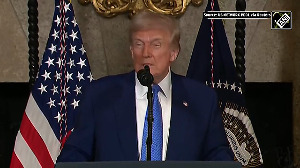If the exit polls held so far are to be believed, the BJP-led NDA will have a hard time retaining its hold on power. This prospect has sent the BJP scampering for votes wherever it can find them. It is also taking a shot at busting the Muslim votebank in a desperate bid to retain, if not gain, more seats in the Hindi heartland.
It won't work. Political brands cannot be repositioned overnight. Muslims are not going to vote for the BJP even if they have a soft corner for Vajpayee as an individual.
In politics, as in the corporate world, customers buy brands on the basis of perceived functional and emotional attributes. If the BJP wants to be seen as a party of governance and "genuine" secularism, it will have to work for it. It cannot change its spots overnight and expect to win big.
India Votes 2004: Complete Coverage
The reason is simple: the BJP has got where it has by emphasising its Hindu heart. This positioning (which includes a holier-than-thou claim to nationalism) has been developed over half a century, and especially during the last 15 years of the Ayodhya movement.
Its positioning has been reinforced by the propaganda of its opponents, who have consistently insisted that the BJP is Hindutva personified even when the party has sometimes tried to distance itself from it. This is not going to change by offering to recruit a few thousand Urdu teachers or increasing Haj subsidies.
On the contrary, the BJP leadership needs to ask itself if its current positioning is actually something it wants to lose. To be seen as fighting for Hindu interests is not the same as defending the carnage in Gujarat.
If there is space in the secular spectrum for parties depending on caste and religious groups (in Kerala, for example), there is no reason why the BJP can't seek a positive Hindu positioning. When companies create brands, they want it to occupy a certain position in the customer's mind.
If they want to cater to another segment of the market, they either create a new brand to occupy untenanted areas or consciously add attributes to the current brand so that it moves closer to the intended positioning -- in stages. They cannot reposition niche brands as mainstream overnight, especially when the mainstream segment is well-tenanted.
Now, look at the Indian political landscape. Currently, in terms of perception, the BJP stands for Hindu interests, the Congress for dynasty (by implication, it is above caste and sectarianism), the Left for the poor and/or organised labour, the BSP for Dalits, and the rest for various caste or regional combinations. Nobody stands specifically for governance, though the Congress has some tenuous claim to it.
The clear gap in the market is the Muslim vote. Various parties -- the Congress at the Centre, the Left in pockets, and the Mulayam/Laloo types in various states -- have garnered Muslim votes by playing on their insecurities, but the market for the Muslim vote is there for the taking by any party that truly represents them either regionally or nationally.
Ask any Muslim, and the chances are he will view most Muslim leaders in the national parties as quislings -- leaders with limited power to help Muslims advance their economic and other interests.
In this scenario, can a BJP, with its Hindu positioning, ever garner Muslim votes? Even if one can make this preposterous assumption, can it then retain its Hindu vote?
The BJP cannot be both Hindu and Muslim in terms of its positioning. If it wants to move to the political centre, it can happen only by abandoning its Hindu core. This means it has to first lose it current base and then try and build a new non-sectarian constituency. That, clearly, can't happen in the real world where the idea is to grab power by any means.
Does this mean sectarian parties cannot grow out of their narrow confines? Actually, it doesn't. For parties that want to retain their old positioning and still move towards the political centre, the logical option is to build alliances that will complement their brand positioning.
In fact, this is what the BJP has been trying with Mayawati -- to augment its upper caste base with Mayawati's Dalit base. The combination hasn't worked so far because of the immaturity of Dalit politics, where Mayawati has been more interested in projecting Dalit power than in actually doing a wider deal to economically benefit her constituency.
The answer to the BJP's dilemma is simple: do with Muslims what it has been trying to do with BSP. Rather than trying to prove to Muslims that it is a party wedded to secularism, it should try to align with genuinely Muslim parties in various regions and work out power sharing deals that will benefit ordinary Muslims. That's a better route to permanent power than trying to woo Muslims around election time with fake promises.







 © 2025
© 2025